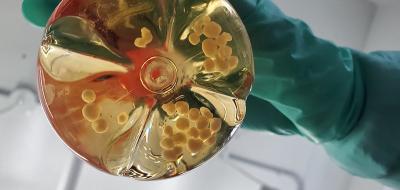
With advances in 3D bioprinting and tissue engineering technologies, the development and use of complex in vitro model systems such as microphysiological systems (MPS) is rapidly growing to study organ function, disease, drug discovery, drug efficacy and toxicology.
NIAID provides preclinical services using human cell-based MPS and organoids to test promising therapeutic candidates that combat viruses of biodefense (pandemic) concern.
These models include organ-on-chip technologies where miniature tissues are constructed using multiple cell types of an organ inside polymer chips and perfused with fluids. Organoids comprised of 3D mixed cell-type structures may also be available. Human MPS and organoids have demonstrated their ability to recapitulate key features of organ physiology and responses to chemicals in a species-specific manner.
Services Provided
NIAID MPS services include single organ-focused chips or organoids derived from human cell types with flow. Some systems including vascular compartments may also be available.
Testing for therapeutics against priority viruses only includes:
- Dosing experiments
- Toxicity testing
- Efficacy testing
Types of organ chips and pathogens targeted are based on contract availability. Viruses tested include pandemic or biodefense concern. Examples include organ-on-chip (OoC) representing lung and vasculature. For other organ models please inquire.
For more information, please see Preclinical Models of Infectious Diseases or contact pcmid@mail.nih.gov to inquire about availability.
For information about additional product development resources, please see Support for Infectious Disease Product Developers.
Related News
NIH to prioritize human-based research technologies
The National Institutes of Health (NIH) is adopting a new initiative to expand innovative, human-based science while reducing animal use in research.
Related Resources
- Complement Animal Research In Experimentation (Complement-ARIE) Program – NIH Common Fund
- National Toxicology Program Interagency Center for the Evaluation of Alternative Toxicological Methods (NICEATM)
- National Center for Advancing Translational Sciences Tissue Chip Projects & Initiatives
- U.S. Food and Drug Administration Alternative Methods

